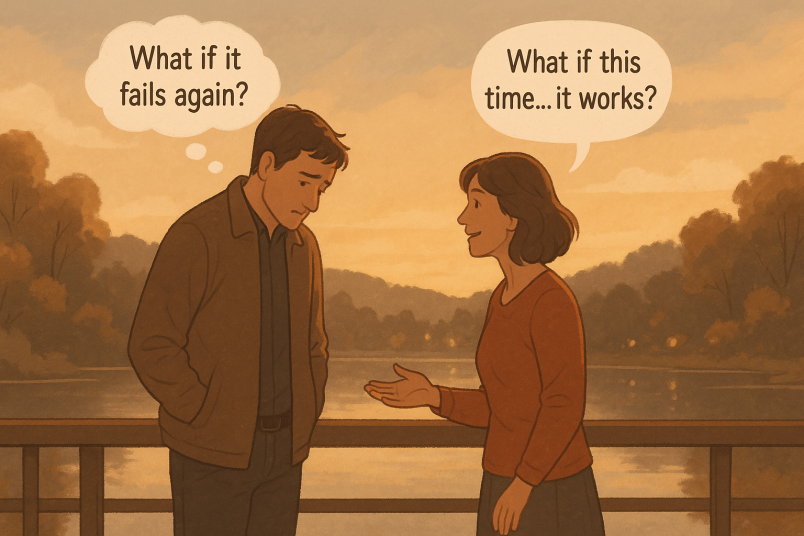How to Overcome Fear of Marriage After Divorce

Heal & Grow Daily for a Happier Relationship
Subscribe FREEKey Takeaways
Marriage.com AI Quick Summary
“Maybe it’s safer to stay single…” You tell yourself after another memory of the past creeps in. It’s strange—your heart wants connection, yet your mind still flinches at the thought of commitment.
One moment you’re hopeful; the next, you’re replaying old arguments, legal papers, broken promises… and wondering if love is worth the risk again. That lingering fear of marriage after divorce can show up quietly—through hesitation, overthinking, or even pushing people away before they get too close.
It’s not about being weak; it’s about being human… and trying to trust again when trust once broke you.
Why is there a fear of marriage after divorce
Fear of marriage after divorce often comes from emotional scars, loss of trust, and the fear of repeating past mistakes. When someone has experienced betrayal, conflict, or painful endings, their nervous system becomes protective—making commitment feel risky instead of comforting.
The fear of marriage can also stem from financial stress, fear of failure, or worrying about how others will judge a second attempt.
A research paper published in 2021 states that remarriage after divorce involves both positive and negative changes: people reshape roles, relationships, and social expectations while navigating emotional, cultural, and family tensions.
Example: Someone who went through a messy divorce may start dating again, but pulls away the moment things get serious. Even if their new partner is kind, they might overthink small issues or assume the worst because their brain remembers how quickly “happy” once turned into “hurt.”
Please note:
If this sounds familiar, please know you’re not broken—you’re healing. With time, support, and the right partner, it’s possible to rebuild trust, grow stronger, and move beyond the fear of marriage after divorce without rushing or forcing the process.
5 common fears of marriage after divorce
After a divorce, the idea of getting married again can feel confusing—you might want love, but also feel deeply guarded. This mix of hope and hesitation is completely normal.
Many people experience emotional triggers, trust issues, or practical concerns that make remarriage feel risky. Below are the most common fears people face, along with examples to make them easier to relate to.
1. Fear of repeating past mistakes
One of the biggest worries is ending up in the same unhealthy patterns. When someone has already been hurt, their brain stays alert to danger, even in safe relationships. This can lead to overthinking or avoiding emotional closeness.
A research paper published in Social Science & Medicine states that post-divorce mental health and relationship stability are deeply influenced by social support, economic resources, and personal resilience.
People may doubt their judgment and fear choosing the wrong partner again. The fear of marriage after divorce often comes from not trusting themselves to make a better decision.
- Example: You notice a small disagreement and immediately panic, thinking it will turn into the same kind of conflict you had before.
2. Fear of losing independence
After rebuilding life alone, the idea of sharing space, money, or decisions can feel suffocating. Some people finally feel free after a divorce and worry that marriage will take that freedom away.
They may fear sacrificing personal goals or identity in the process. This fear isn’t selfish—it’s self-protective. Feeling safe in independence can make commitment feel like a step backward.
- Example: You hesitate to move in with someone because you’re afraid of losing control over your daily routine.
3. Fear of financial instability
Divorce can be expensive and emotionally draining, so the financial risk of remarriage is a serious concern. People worry about debt, alimony, or blending finances with someone who may be irresponsible.
Money conflicts are one of the top reasons marriages fail, making this fear logical. Being cautious here shows maturity, not coldness. Seeking clarity and transparency becomes extra important.
- Example: You insist on keeping separate bank accounts because the last time, joint finances caused major stress.
4. Fear of judgment from others
Family or friends may have opinions about remarriage, especially if children are involved. People often worry about being judged for “moving on too soon” or making another mistake.
Social pressure can create anxiety and hesitation. It’s also common to fear disappointing children or repeating the cycle for them. This fear is deeply emotional and tied to reputation and relationships.
- Example: You avoid talking about your new partner because you’re nervous about how your family might react.
5. Fear of emotional vulnerability
To love again, you have to let someone in—and that can feel terrifying after heartbreak. Opening up makes people feel exposed, and many fear being abandoned or betrayed again.
Vulnerability is risky but necessary for real intimacy. The fear of marriage often hides a deeper fear of being hurt. Healing involves rebuilding trust in both yourself and others.
- Example: You keep emotional walls up even when your new partner tries to connect on a deeper level.
How to overcome fear of marriage after divorce
Feeling nervous about the idea of marriage again after divorce is more common than most people admit. You’ve lived through real pain, so your heart naturally tries to protect you.
The good news? Healing is possible. With the right mindset and practical steps, you can rebuild trust, confidence, and hope—without rushing. Below are seven supportive ways to guide you gently forward.
1. Reflect on what went wrong—and what you learned
Understanding your past marriage helps you avoid repeating the same patterns. Instead of blaming yourself or your ex, focus on lessons and growth. This kind of reflection builds self-awareness and emotional maturity. It also helps you see that the past doesn’t define your future. Growth turns pain into wisdom.
How you can start:
- Write down 3 lessons you learned from your past relationship
- Identify behaviors you don’t want to repeat
- Acknowledge areas where you’ve grown
2. Work on emotional healing first
Jumping into a new relationship without healing increases anxiety and fear. Take time to process emotions like anger, grief, guilt, or betrayal. Therapy, journaling, or support groups can help. Emotional healing helps calm your nervous system, so commitment feels safer. A healthy heart makes better choices.
How you can start:
- Talk to a therapist about unresolved feelings
- Practice mindfulness or breathing exercises
- Give yourself permission to heal at your own pace
3. Rebuild trust in yourself
After a divorce, many people stop trusting their own judgment. You might fear choosing the wrong partner again. Start by rebuilding confidence in your decisions. Honor your boundaries and values. When you trust yourself, you no longer ignore red flags—and that makes commitment less scary.
How you can start:
- Make small decisions and follow through
- List your non-negotiables in relationships
- Remind yourself of past times you made good choices
4. Communicate openly with your partner
Healthy communication prevents misunderstandings and builds security. Be honest about your fears and expectations. A mature partner will listen, support, and reassure you.
Open conversations also help you both plan for a stable future. Communication is one of the strongest tools in how to overcome the fear of marriage after divorce.
How you can start:
- Share how past experiences affect you
- Discuss values, goals, and future plans
- Practice active listening during disagreements
5. Set boundaries and move slowly
You don’t have to rush into anything. Taking things slow gives you time to build trust naturally. Clear boundaries help you feel safe and respected. When the pace feels comfortable, the fear of marriage after divorce becomes easier to manage. Moving slowly is not hesitation—it’s wisdom.
How you can start:
- Define what “moving slow” means to you
- Communicate those boundaries clearly
- Check in with yourself regularly about comfort levels
Watch this TED Talk by Candace Plattor, an addiction therapist, who shares how healthy love requires clear boundaries, self-respect, and saying “no” when needed.
6. Strengthen your support system
You don’t have to face this alone. Friends, family, mentors, or support groups can offer perspective and encouragement. Surround yourself with people who believe in healthy love. A strong support system reminds you that second chances can work. You are not the only one starting over.
How you can start:
- Spend time with people in healthy relationships
- Join a divorce recovery or remarriage group
- Ask trusted friends for honest feedback
7. Focus on building a healthier kind of love
Marriage doesn’t have to look like the past. This time, you can choose differently. Look for emotional safety, mutual effort, and personal growth. Healthy love is calm, respectful, and consistent—not chaotic. When your relationship is built on the right foundation, fear turns into readiness.
How you can start:
- Choose partners who respect your boundaries
- Build emotional intimacy before commitment
- Celebrate small relationship wins together
Please note:
Healing takes time, but it’s absolutely possible. When you understand, heal, and choose wisely, marriage can become not something to fear—but something that feels safe, supportive, and deeply fulfilling.
FAQ
Starting over after divorce often raises a lot of questions—about love, trust, timing, and emotional safety. These FAQs offer gentle, to-the-point guidance on common concerns people face while considering marriage again.
-
Is it normal to feel scared about getting married again?
Yes, it’s completely normal. Divorce can leave emotional scars, so feeling cautious simply means you’re protecting yourself and wanting to do better the next time.
-
How long should I wait before considering remarriage?
There’s no fixed timeline. It’s less about time and more about healing, emotional readiness, and feeling confident in your ability to choose a healthy partner.
-
Can second marriages be successful?
Absolutely. Many second marriages thrive when couples communicate better, apply past lessons, and build their relationship on trust, respect, and emotional maturity.
Hope after heartbreak
Fear of marriage after divorce is natural, but it doesn’t have to define your future. With healing, self-awareness, and intentional choices, love can feel safer and healthier than before. Remarriage isn’t about “trying again”—it’s about creating something wiser, calmer, and more genuine.
You’re not starting from zero; you’re starting from experience. When the right person meets the healed version of you, marriage can become a partnership built on trust, growth, and mutual care. Take your time—your next chapter can be your strongest one yet.
Stuck in conflict and unsure how to move forward together?
 Tips
Tips
Write your tip or submit a video tip
All tips are reviewed before the publishing.
Share this article on
Recent Articles
Related Quizzes
Heal & Grow Daily for a Happier, Healthier Relationship
Subscribe FREE on YouTube We'd love your feedback!
We'd love your feedback!
 Expert Q&A
Expert Q&A
Ask your question related to this topic & get the support you deserve from experts.





















 Thanks for your feedback!
Thanks for your feedback!